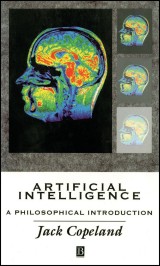Details

Artificial Intelligence
A Philosophical Introduction1. Aufl.
|
33,99 € |
|
| Verlag: | Wiley-Blackwell |
| Format: | EPUB |
| Veröffentl.: | 29.07.2015 |
| ISBN/EAN: | 9781119189855 |
| Sprache: | englisch |
| Anzahl Seiten: | 336 |
DRM-geschütztes eBook, Sie benötigen z.B. Adobe Digital Editions und eine Adobe ID zum Lesen.
Beschreibungen
Presupposing no familiarity with the technical concepts of either philosophy or computing, this clear introduction reviews the progress made in AI since the inception of the field in 1956. Copeland goes on to analyze what those working in AI must achieve before they can claim to have built a thinking machine and appraises their prospects of succeeding. <p>There are clear introductions to connectionism and to the language of thought hypothesis which weave together material from philosophy, artificial intelligence and neuroscience. John Searle's attacks on AI and cognitive science are countered and close attention is given to foundational issues, including the nature of computation, Turing Machines, the Church-Turing Thesis and the difference between classical symbol processing and parallel distributed processing. The book also explores the possibility of machines having free will and consciousness and concludes with a discussion of in what sense the human brain may be a computer.</p>
<p>List of figures x</p> <p>Acknowledgements xi</p> <p>Introduction 1</p> <p>In outline 2</p> <p>1 The beginnings of Artificial Intelligence: a historical sketch 4</p> <p>2 Some dazzling exhibits 11</p> <p>3 Can a machine think? 33</p> <p>4 The symbol system hypothesis 58</p> <p>5 A hard look at the facts 83</p> <p>6 The curious case of the Chinese room 121</p> <p>7 Freedom 140</p> <p>8 Consciousness 163</p> <p>9 Are we computers? 180</p> <p>10 AI’s fresh start: parallel distributed processing 207</p> <p>Epilogue 249</p> <p>Notes 250</p> <p>Blibliography 283</p> <p>Index 299</p>
<p>"An excellent job ... the most balanced treatment of the hopes and claims of AI I have yet seen." Hubert Dreyfus, University of California</p> <p>"The best philosophical introduction to artificial intelligence available." Justin Leiber, University of Houston</p>
<b>Jack Copeland</b> is Senior Lecturer in philosophy and logic at the University of Canterbury, New Zealand. He has published widely on logic, philosophy of mind and philosophy of language, and is editor of <i>Logic and Reality</i> (1993).
Presupposing no familiarity with the technical concepts of either philosophy or computing, this clear introduction reviews the progress made in AI since the inception of the field in 1956. Copeland goes on to analyze what those working in AI must achieve before they can claim to have built a thinking machine and appraises their prospects of succeeding. <p>There are clear introductions to connectionism and to the language of thought hypothesis which weave together material from philosophy, artificial intelligence and neuroscience. John Searle's attacks on AI and cognitive science are countered and close attention is given to foundational issues, including the nature of computation, Turing Machines, the Church-Turing Thesis and the difference between classical symbol processing and parallel distributed processing. The book also explores the possibility of machines having free will and consciousness and concludes with a discussion of in what sense the human brain may be a computer.</p>

















